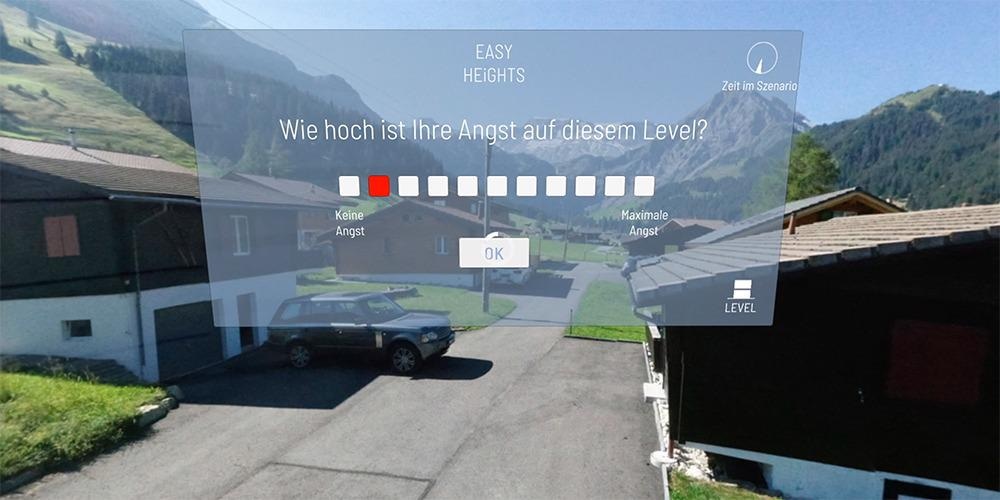Feb 12 2021
Scientists from the University of Basel have designed a new virtual reality (VR) app for smartphones to decrease the fear of heights.
 In the virtual reality app, users gradually rise to greater heights and can indicate the degree of their fear at each level. Image Credit: Bentz et al., NPJ Digital Medicine 2021.
In the virtual reality app, users gradually rise to greater heights and can indicate the degree of their fear at each level. Image Credit: Bentz et al., NPJ Digital Medicine 2021.
The team has recently performed a clinical trial to explore the efficacy of the new app. Trail subjects, who devoted a total of four hours of training with the new app at their homes, demonstrated an improvement in their potential to manage real height scenarios.
Fear of heights is an extensive phenomenon and around 5% of the general public experiences a debilitating level of uneasiness in height situations. But individuals affected by Fear of heights seldom take advantage of the existing treatment options, like exposure therapy, in which the person is placed in the anxiety-causing situation under the supervision of an expert.
On one side, individuals are unwilling to face their fear of heights, and on the other side, it can be hard to recreate the right kinds of height conditions in a therapy setting.
This made the interdisciplinary team of researchers, headed by Professor Dominique de Quervain from the University of Basel, to design a virtual reality exposure therapy app for smartphones, known as Easyheights.
The new app utilizes 360° images of real places, which were captured by the researchers with the help of a drone. Individuals can use the new app on their own smartphones, along with a unique virtual reality headset.
Gradually Increasing the Height
At the time of virtual experience, the user is allowed to stand on a platform that is originally 1 m above the ground level. After getting adjusted to the situation for a specific interval, the platform automatically increases. In this manner, the apparent distance above the ground rises gradually but steadily without increasing the level of fear in the person.
The researchers investigated the efficacy of this method in a controlled, randomized trial and have published the results of the study in the NPJ Digital Medicine journal.
In total, 50 trial participants who are scared of heights either finished four hours of the height training program (six 30-minute sessions and one 60-minute session over the duration of two weeks) utilizing virtual reality, or were deployed to the control group, which did not finish these training sessions.
Both before and after the training phase—or the same duration of time without the training phase—the trial participants climbed the Uetliberg lookout tower close to Zurich as far as their fear of heights permitted them.
The team then captured the level of height reached by the trial participants together with their subjective level of fear at each tower level. Toward the end of the trial, the team assessed the results from 25 subjects from the control group and from 22 subjects who finished the Easyheights training.
The group that finished the training phase with the new app displayed less fear on the tower and was able to climb more toward the top of the tower than they could before finishing the training phase. The control group did not show any positive changes. The efficacy of the Easyheights training app demonstrated to be similar to that of traditional exposure therapy.
Therapy in Their Own Living Rooms
For over 20 years, scientists have been exploring the use of virtual reality for treating fear of heights.
What is new, however, is that smartphones can be used to produce the virtual scenarios that previously required a technically complicated type of treatment, and this makes it much more accessible.
Dr Dorothée Bentz, Study Lead Author, University of Basel
The study results indicate that the frequent use of a smartphone-based virtual reality exposure therapy can considerably enhance the behavior as well as the subjective state well-being in height scenarios.
Individuals who have a mild fear of heights could soon download the free app from leading app stores and could finish the training sessions on their own. But the team recommended that those who suffer from a serious fear of heights should use the app under the guidance of an expert.
The new study is one of the many projects that are ongoing at the Transfaculty Research Platform for Molecular and Cognitive Neurosciences, headed by Professor Andreas Papassotiropoulos and Professor Dominique de Quervain. The objective of the duo is to enhance the treatment of mental disorders via the use of novel technologies and to make these therapies extensively available.
Journal Reference
Bentz, D., et al. (2021) Effectiveness of a stand-alone, smartphone-based virtual reality exposure app to reduce fear of heights in real-life: a randomized trial. npj Digital Medicine. doi.org/10.1038/s41746-021-00387-7.